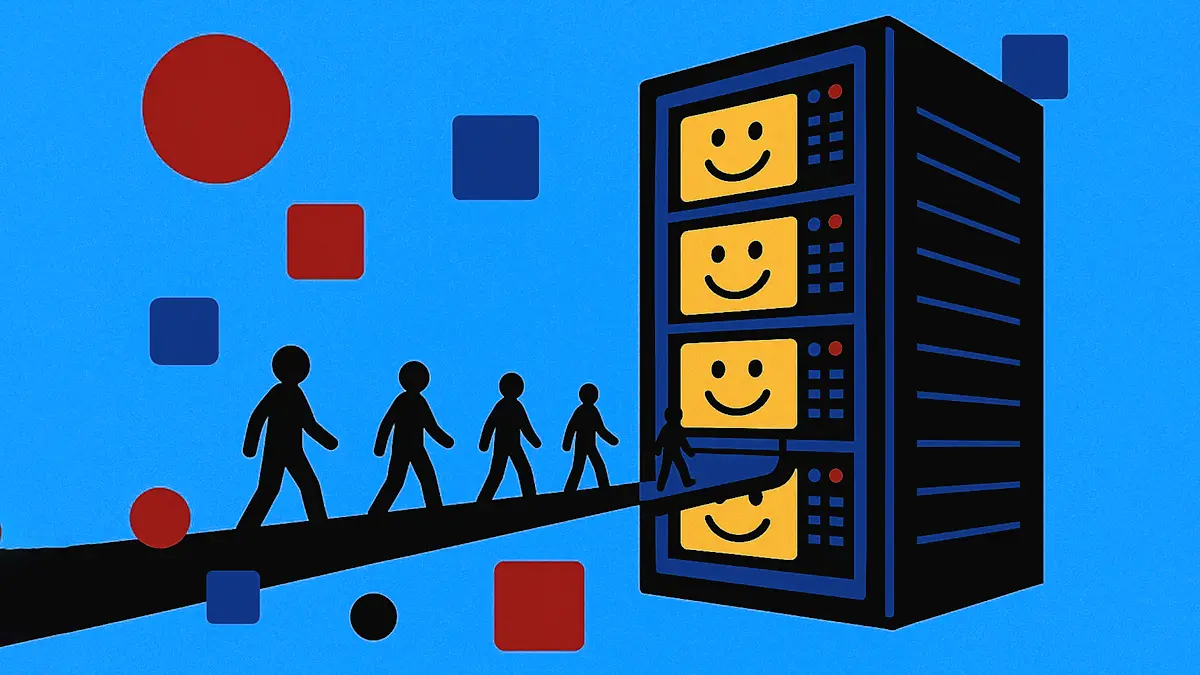The debate between AI agents and traditional agents is heating up, with each bringing unique strengths to the table. Whether you’re a customer service specialist or just curious about the latest trends, understanding the dynamics of AI agents vs. traditional agents can help you navigate the future of customer interactions. Let’s dive into this fascinating topic and explore how both AI and human agents are reshaping the landscape of customer service.
What are AI Agents?
AI agents are like your tech-savvy friends who never sleep. These digital assistants use advanced technologies like artificial intelligence, machine learning, and natural language processing to interact with customers. From chatbots that pop up on websites to virtual assistants like Siri and Alexa, AI agents are designed to provide quick and efficient service. They can handle everything from simple inquiries to more complex tasks, all while learning and improving over time.
Why AI Agents are Gaining Popularity
Imagine a world where you can get help at any time, day or night. That’s one of the biggest advantages of AI agents. They’re available 24/7, which means no more waiting for business hours to resolve an issue. This constant availability is a game-changer for customer service, especially for global companies with customers in different time zones. Moreover, AI agents can handle multiple queries at once, making them incredibly efficient. This capability not only speeds up response times but also ensures that no customer is left waiting.
I remember once being stuck at an airport at 2 AM, desperately needing to change my flight. The airline’s AI chatbot was a lifesaver, guiding me through the process smoothly and without delay. This experience was a clear reminder of how invaluable AI agents can be in providing round-the-clock support. It’s not just about convenience; it’s about providing reliable service when customers need it the most.
The Human Touch: Traditional Agents
The Strengths of Traditional Agents
Let’s not forget the comforting aspect of talking to a real person. Traditional agents bring empathy and a personal touch that machines can’t replicate—at least, not yet. They’re excellent at handling complex issues that require a nuanced understanding and can offer tailored advice based on individual needs. This human element is particularly valuable in situations that involve emotional or sensitive topics. For example, resolving a billing dispute or addressing a service failure often requires a level of understanding and empathy that only a human can provide.
One time, a friend shared how a customer service representative at a bank helped them sort out a complicated financial issue. The agent’s patience and understanding turned a potentially stressful situation into a positive experience. This kind of personal interaction is where traditional agents truly shine. They can build rapport and trust with customers, which is crucial for maintaining long-term customer relationships. While technology is evolving rapidly, the need for human empathy and judgment in certain situations remains irreplaceable.
The Challenges of Traditional Agents
However, traditional agents have their limitations. They aren’t available 24/7, and during peak times, response times can slow down. This limitation can be frustrating for customers who need immediate assistance. Additionally, traditional agents are only human—mistakes can happen, and the quality of service can vary from one agent to another. Factors like training, experience, and even the agent’s mood can influence the quality of the interaction. This variability can lead to inconsistent customer experiences, which is a significant drawback compared to the standardized responses provided by AI agents.
AI Agents vs. Traditional Agents: A Comparative Analysis
AI Agents vs. Traditional Agents: Response Time and Availability
When it comes to response times, AI agents take the cake. They’re always on and can handle a multitude of queries at once. This is especially useful during busy periods when human agents might struggle to keep up. The ability of AI agents to provide instant responses around the clock is a major advantage. For businesses, this means they can offer consistent service quality without worrying about time zones or peak periods. For customers, it means faster resolutions and less time spent waiting.
On the flip side, traditional agents may have limited availability and longer response times, especially during peak hours. However, they make up for it with their ability to empathize and understand complex emotions and contexts. While AI can handle the what and when of customer inquiries, human agents excel in the how, offering nuanced solutions that are tailored to the individual customer. This capability is invaluable in situations where understanding the customer’s emotional state or specific needs is crucial for a satisfactory resolution.
Personalization and Empathy
AI agents are getting better at personalizing responses by using customer data. They can analyze previous interactions, purchase history, and even social media activity to tailor their responses. However, they can sometimes come off as robotic and lack the human touch. While AI can provide data-driven recommendations, it often lacks the ability to understand and respond to the emotional nuances of a conversation. For instance, an AI agent might struggle to identify when a customer is frustrated or upset, leading to responses that, while technically correct, miss the emotional context.
Traditional agents, on the other hand, excel in providing a personalized experience. They can pick up on verbal cues, tone, and the subtleties of human emotion, offering a level of empathy and understanding that machines simply can’t match. This human touch can be particularly important in customer service scenarios that require sensitivity, such as handling complaints or providing support during a personal crisis. In these situations, the ability to empathize and respond appropriately can make a significant difference in the customer’s experience.
Scalability and Cost
AI agents are highly scalable. They can easily be programmed to handle a large volume of inquiries, making them cost-effective. For businesses, this scalability means they can expand their customer service operations without a corresponding increase in costs. AI agents can also handle repetitive tasks, freeing up human agents to focus on more complex issues. This can lead to more efficient use of resources and better overall service quality.
Traditional agents, on the other hand, require training and can only handle so many customers at once. This makes AI agents a more scalable and cost-efficient option for businesses looking to expand. However, it’s important to note that the cost savings of AI agents need to be weighed against the potential loss of the personal touch that human agents provide. While AI can handle the bulk of routine inquiries, there will always be a need for human agents to address more complex or emotionally charged issues.
Complexity of Issues
AI agents are great for straightforward questions and issues. They excel in handling routine inquiries, such as checking account balances, updating information, or providing simple instructions. However, they often struggle with more complex or emotionally charged situations. This limitation is partly due to the current state of AI technology, which, while advanced, still lacks the nuanced understanding required for complex problem-solving.
Traditional agents can navigate these tricky waters, providing nuanced and thoughtful responses that a machine simply can’t. They can think critically, adapt to changing situations, and offer creative solutions. This human flexibility is invaluable in scenarios where there’s no clear-cut answer or when the customer’s needs are unique. While AI can assist in these situations by providing relevant data or options, the final decision-making often requires a human touch.
The Future of Customer Service: A Hybrid Approach
The Best of Both Worlds: Combining AI and Traditional Agents
So, which is better: AI agents or traditional agents? The answer isn’t black and white. The future of customer service lies in a hybrid approach that leverages the strengths of both. AI agents can handle routine queries, freeing up human agents to tackle more complex issues. This balance ensures that customers receive efficient service without sacrificing the personal touch. By combining the scalability and efficiency of AI with the empathy and critical thinking of human agents, businesses can offer a more comprehensive and satisfying customer experience.
This hybrid model is already being adopted by many forward-thinking companies. For example, AI agents can handle initial customer inquiries, provide basic information, and even solve straightforward issues. If the problem is too complex, the AI can seamlessly transfer the customer to a human agent, along with all relevant information. This approach not only improves efficiency but also enhances the overall customer experience by ensuring that each interaction is handled by the most appropriate resource.
Ethical and Privacy Considerations
As we move towards more AI-driven customer service, it’s crucial to consider ethical and privacy issues. Ensuring that AI interactions are transparent and that customer data is secure is paramount. Customers need to feel confident that their data is being used responsibly and that their privacy is protected. Businesses must be transparent about how they use AI and the data collected, maintaining trust and compliance with regulations.
Moreover, as AI technology continues to evolve, there’s a growing need for ethical guidelines to govern its use in customer service. Issues such as bias in AI decision-making, the need for transparency in automated processes, and the potential for job displacement are all important considerations. Companies that adopt AI in customer service must not only focus on the technological and economic benefits but also on the social and ethical implications of their use.
Finding Your Balance
In the ongoing debate of AI agents vs. traditional agents, the key takeaway is that both have their unique strengths. By understanding and leveraging these, businesses can create a customer service strategy that’s both efficient and empathetic. Whether it’s through a friendly chatbot at 2 AM or a compassionate human agent, the goal is the same: to provide the best possible experience for the customer.
So, the next time you’re setting up your customer service strategy, consider a blend of both AI and human touch. This balanced approach not only optimizes efficiency but also ensures that your customers feel valued and heard. After all, in the end, customer satisfaction is the ultimate goal. As we look to the future, it’s clear that the most successful customer service strategies will be those that skillfully blend technology with human empathy, providing a seamless and satisfying customer.











